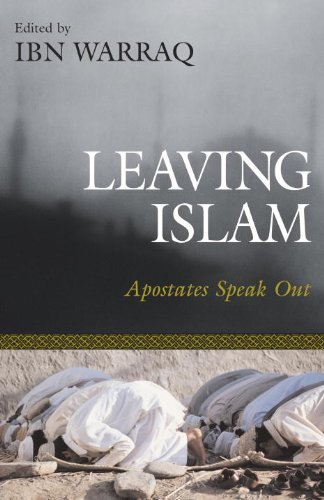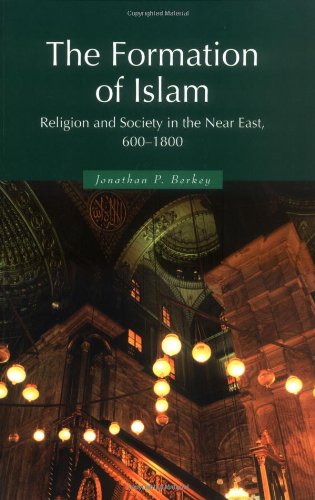By Fazlur Rahman
"In this paintings, Professor Fazlur Rahman provides a absolutely formidable blueprint for the transformation of the highbrow culture of Islam: theology, ethics, philosophy and jurisprudence. Over the voices advocating a go back to Islam or the reestablishment of the Sharia, the consultant for motion, he astutely and soberly asks: What and which Islam? extra importantly, how does one get to 'normative' Islam? the writer counsels, and passionately demonstrates, that for Islam to be truly what Muslims declare it to be—comprehensive in scope and efficacious for each age and place—Muslim students and educationists needs to reevaluate their method and hermeneutics. In spelling out the mandatory and sound technique, he's without delay brave, severe and profound."—Wadi Z. Haddad, American-Arab Affairs
Leaving Islam: Apostates Speak Out by Ibn Warraq

By Ibn Warraq
Defying the loss of life penalty acceptable to all apostates in Islam, the ex-Muslims who're the following represented think it's their responsibility to talk up opposed to their former religion, to inform the reality concerning the quickest starting to be faith on the earth. those former Muslims, from all components of the Islamic international, recount how they slowly got here to gain that the faith into which they have been born used to be in lots of respects unimaginable and occasionally even dangerous.
These memoirs of private trips to enlightenment and highbrow freedom make for relocating analyzing and are a brave sign to different ex-Muslims to come back out of the closet.
Islam and English Law by Robin Griffith-Jones
By Robin Griffith-Jones
Hazardous Associations : In the Name of Al- Islam by Khidr Abdul Razzaq
By Khidr Abdul Razzaq
Demanding Dignity: Young Voices from the Front Lines of the by Maytha Alhassen,Ahmed Shihab-Eldin
By Maytha Alhassen,Ahmed Shihab-Eldin
Their voices are as different as their person tales, yet their destinies are shared. they're the hooked up generation.
Their own tales, advised by means of 20 members from nine varied international locations, meet at a crossroads someplace among journalistic first-hand reviews with obtainable, intimate magazine entries.
Inspired partly by means of common human values and aspirations, every one tale captures the very alterations revolutionizing the sector: Social media's position in uniting like-minded electorate via civic engagement.
A Nubian tackle revolution and restitution in Egypt. A Saudi-woman who steps into the motive force seat to alter her daughter's destiny simply because her mom could not swap her current. The repeated reminder of torture in way of life. The tumultuous trip as a tender Egyptian navigates his travels via social and political upheavals from Egypt to Syria.
Their trips element to a imaginative and prescient of pan-Arab identification as visible within the manifestation in their shared spirit of attached struggles. Their voices jointly sound a end result of demands human dignity that mirror the voices in their fellow voters and the struggles that include demanding political, spiritual and traditional authorities.
RUMI - 53 Secrets from the Tavern of Love: Poems from the by Amin Banani,Anthony A. Lee
By Amin Banani,Anthony A. Lee
The publication has 3 sections: 1) a basic creation to Rumi's poetry, 2) translations of fifty three brief poems, and three) a groundbreaking essay through Banani at the place of Rumi in Islamic poetry and in global literature.
The poems are offered as classes on love. The reader is inspired to regard them as koans to encourage religious contemplation.
A Fundamental Fear: Eurocentrism and the Emergence of by S. Sayyid,Hamid Dabashi
By S. Sayyid,Hamid Dabashi
Writing in 1997, sooner than Sep 11 and prior to the austerity that has bred a brand new new release of a ways correct teams throughout Europe and the USA, S. Sayyid warned of a spectre haunting Western civilization. This groundbreaking ebook, banned via the Malaysian executive, is either an research of the stipulations that experience made ‘Islamic fundamentalism’ attainable and a provocative account of the ways that Muslim identities have come to play an more and more political position through the world.
This is a pioneering, provocative and intricately crafted examine, which indicates the problem of Islamism is not just geopolitical or maybe cultural but in addition epistemological.
Shifting Allegiances: Networks of Kinship and of Faith: The by Moyra Dale,Peter G. Riddell
By Moyra Dale,Peter G. Riddell
This particular exam of a women's mosque software locations it in the wider modern circulation of piety and da'wa (mission) in Islam, providing an perception into the forces which are shaping groups and international locations today.
"It is sort of unbearably poignant to learn Moyra Dale's description of a colourful Muslim women's crew in Damascus at a time while Syria's tensions pervade the media, and the people she describes have scattered. The brilliant and loving description of the ladies is a crucial list of imperiled humanity, and the research when it comes to altering allegiances deals a device for figuring out the various communal and relatives dynamics of latest world."
--Ida Glaser, Director of The Centre for Muslim-Christian reviews, Oxford; Co-author of Thinking Biblically approximately Islam: Genesis, Transfiguration, Transformation
"This exact case examine describes a brand new memetic perfect as girls in a mosque sorority shifted their allegiance from kinship to the mosque as a huge locus of id. that modify happened as they embodied practices and built their voices as ladies 'seeking reference to the prophet Muhammad.' Of curiosity to Islamic students and women's reviews researchers on communal identification and performative practices, this e-book makes a well timed contribution to an international that wishes extra nuanced perspectives of Islam."
--Frances S. Adeney, William A. Benfield Professor Emerita of Evangelism and international challenge, Louisville Presbyterian Theological Seminary
Moyra Dale has lived and labored for a few years within the center East, quite Egypt and Syria. She has been taken with instructing and instructor education in Arabic grownup Literacy, and educating English as a overseas Language. She now teaches in Cultural Anthropology and Islam.
The Formation of Islam: Religion and Society in the Near by Jonathan P. Berkey

By Jonathan P. Berkey
Die Seele in der arabischen Korankommentarliteratur (German by Magdy Elleisy
By Magdy Elleisy
Meine Arbeit konzentriert sich auf eine Auswahl von Qur’ānkommentaren und behandelt ein eingeschränktes Feld islamischen Wissens, in welchem Grundzüge des islamischen Verständnisses von Seele, der rūḥ, zu erkennen sind, doch ist die Entwicklung eines Gesamtkonzeptes weiterhin notwendig.
Die mangelnde Unterscheidung bzw. Vermischung von ruh und nafs in den tafsiren verhindert die getrennte Auffassung dieser Konzepte. Ar-rūḥ wird oft als Lebensenergie begriffen, durch den Akt des Einhauchens durch Gott dem organischen Körper hinzugefügt. Dass dies zum ersten Male bei Adam geschah, unterstreicht den göttlichen Charakter der rūḥ.
Dieser spiegelt sich in Meinungen wieder, in denen sowohl der Qur’ān wie auch sein Überbringer Gabriel als rūḥ bezeichnet werden.
Die Unterscheidung zwischen rūḥ und nafs spielt besonders in den ṣūfischen tafsīren eine Rolle. An-nafs wird als die Seele beschrieben, die beherrscht werden muss und mit dem Körper verbunden ist. In anderen Kommentaren stellen die ṣūfischen nafs einen Teilaspekt der rūḥ dar, da dort teilweise ar-rūḥ körperlich verstanden wird.
Es gibt additionally in den Begriffen einen Unterschied zwischen allgemein sunnitischen und ṣūfischen tafsīren.
Aṭ-Ṭabarsī als šī‘itischer Kommentator nimmt eine Sonderstellung ein, da er sich hauptsächlich auf nafs bezieht, wenn er über die Seele redet.
Ein Vergleich mit der islamischen Philosophie macht die Besonderheit des Seelenbegriffes in den tafsīren besser verständlich. In der islamischen Philosophie wird der Begriff Seele (nafs) in unterschiedlicher shape verwendet. Er bezieht sich auf den pflanzlichen (vegetativen) Teil eines Lebewesens, den tierischen (sensitiven) Teil, den rationalen Teil oder die Gesamtheit aller drei Teile.
Durch ihre Beziehung zum Körper bildet die Seele die shape des Körpers, seine Perfektion.
Eine genaue Untersuchung der Verwendung des Begriffes Seele in den verschiedenen Wissenschaften ist notwendig, um zu verstehen, used to be in der islamischen Ideengeschichte unter rūḥ bzw. nafs verstanden wird. Meine Arbeit stellt einen ersten Schritt zu einer solchen Untersuchung dar.